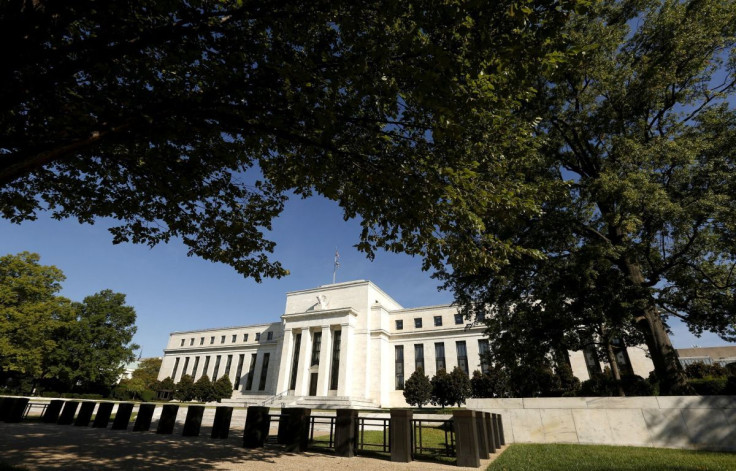Republicans Seek To Block Senate Committee Vote On Biden's Fed Nominees

Republican senators moved on Tuesday to block a vote on President Joe Biden's five nominees to the Federal Reserve, including the reappointment of Jerome Powell as chair, over objections to Sarah Bloom Raskin, the White House's pick to be the central bank's Wall Street regulator.
"I do not think the Committee should proceed with a vote on Ms. Raskin," said Senator Pat Toomey, the top Republican on the Senate Banking Committee, citing what he said were unanswered questions about her past role on the board of a fintech company.
Senator Sherrod Brown, the Democratic chair of the committee, said Democrats would not allow Republicans to "cherry-pick" from the slate of nominees or delay the vote, which was scheduled to begin at 2:15 p.m. (1915 GMT).
If the panel's 12 Republicans do not show up, the 24-member panel would not have a quorum, preventing it from voting on Biden's slate and conducting other business.
Speaking to reporters shortly before the panel was scheduled to meet, Toomey said: "It's my expectation that there will not be a quorum this afternoon."
The development could delay confirmation of key members of the Fed's leadership just as the U.S. central bank is gearing up to raise interest rates to combat the highest inflation in 40 years.
Separately, Senate Republican leader Mitch McConnell planned to meet with Powell on Tuesday to discuss inflation and the economy. While his confirmation for a second four-year term as Fed chief is pending, Powell continues in a "pro tempore" chair role, remaining in charge of both U.S. monetary policy and the central bank.
"If my colleagues are as concerned about inflation as they claim to be, they will not slow down this process, which will only hurt workers, their families, and our recovery," Brown said in a statement released after media reported the Republican boycott plan.
White House spokeswoman Jen Psaki called the Republicans' move "totally irresponsible" given the challenges facing the U.S. economy.
While most Republicans on the panel back a second term for Powell, a Republican initially installed as Fed chair by former President Donald Trump, they appear unified in their objection to Raskin's nomination as the central bank's vice chair for supervision, the top U.S. banking regulatory role.
Republicans have attacked Raskin, who held senior roles at the Treasury and Fed under President Barack Obama, over her past comments on using financial rules to police climate change and have also accused her of inappropriately lobbying on behalf of a fintech firm on whose board she sat, accusations Raskin has denied.
Before news of the boycott emerged, it was widely expected that the committee's vote on Raskin would be deadlocked 12-12. That would not have ended her nomination but would have complicated her path to confirmation by the full Senate, where a simple majority is required for such votes.
The standoff over Biden's Fed nominees is the latest example of the obstacles Democrats have encountered moving forward with their agenda in a body they control only by virtue of Vice President Kamala Harris' tie-breaking vote as Senate president.
Rules agreed at the start of this session of Congress ensure that Senate committees cannot advance legislation or nominees unless at least one Republican is present, a change from the previous Congress when Republicans had an outright majority on committees and could move ahead even when Democrats staged walkouts.
If confirmed, Raskin would become the most powerful banking regulator in Washington, overseeing an ambitious portfolio.
Her key projects would likely include building tools to assess financial risks from climate change, reversing Wall Street breaks granted by her predecessor Randal Quarles and drafting new rules for fair lending and fintechs.
Raskin has been praised by progressive Democrats for her experience and expertise. Moderate Democrats on the Senate Banking Committee also spoke supportively of Raskin at her confirmation hearing, and two of them - Mark Warner of Virginia and Jon Tester of Montana - told Reuters on Monday they both planned to vote for her and the rest of Biden's Fed nominees.
OTHER NOMINEES
The committee was scheduled to vote on four other nominees for Fed slots: Powell, current Fed Governor Lael Brainard, and proposed newcomers Lisa Cook and Philip Jefferson.
Powell, a former investment banker, has broad bipartisan support for another term as Fed chair. His first term expired earlier this month.
Brainard, Cook and Jefferson used their confirmation hearings to signal their backing of Powell's monetary policy agenda, which will see the Fed likely begin lifting interest rates at its March 15-16 policy meeting in a bid to fight the high inflation.
Brainard, a Democrat appointed by Obama to be a Fed governor in 2014, also seems likely to win support for promotion to the vice chair position, which would make her Powell's deputy, despite Republican misgivings that she would push for the central bank to strengthen its climate change policies.
Cook is an economist at Michigan State University, while Jefferson is an economist and currently dean of faculty at Davidson College in North Carolina.
All Democrats on the committee are expected to vote in favor of Cook and Jefferson while at least one Republican, Senator John Kennedy, also indicated he would support them both.
On Tuesday, Republican Senator Kevin Cramer said he would support Jefferson and Powell, was open to Cook, and was a no on Raskin and Brainard.
If Cook and Jefferson, who are Black, are confirmed as governors to the currently all-white Fed Board, it would make it the most racially diverse in the central bank's 108-year history.
© Copyright Thomson Reuters {{Year}}. All rights reserved.





















